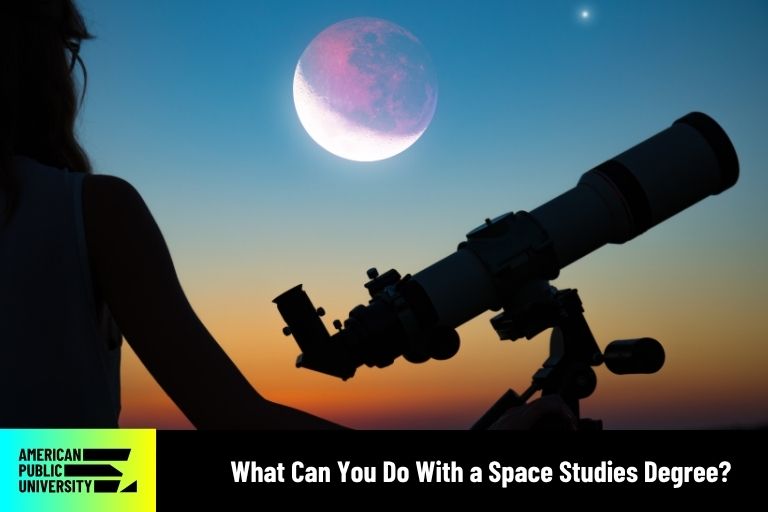08/20/2025

Career Paths You May Pursue with a Space Studies Degree
As humanity’s interest in space continues to grow, so too does the demand for professionals with interdisciplinary training in science, policy, and technology. If you’re curious about how a space studies degree can lead to a fulfilling career, you’re not alone.
Space studies is an academic field encompassing planetary science, space engineering, space policy, and human spaceflight. But what can you do with a space studies degree once you’ve earned it?
Prospective students, career changers, and lifelong learners interested in space-related topics can explore the skills developed in a space studies program and consider potential roles across government, private, and research sectors.
Understanding the Scope of a Space Studies Degree
A degree in space studies introduces students to an interdisciplinary curriculum that includes topics in space physics, aerospace engineering, space operations, and space law. Students build a solid foundation in areas like orbital mechanics, spacecraft systems, and the space environment, while also developing essential skills in writing, research, and analyzing data.
Some space studies programs offer hands-on opportunities through virtual simulations, cohort discussions, and research projects focused on real-world space missions.
Whether students aim to enter the workforce or pursue graduate studies, the field provides exposure to both technical and policy-driven challenges surrounding outer space.
Typical Career Opportunities in the Space Industry
While specific outcomes can vary, graduates of space studies programs may find relevance in a range of space-adjacent fields, including:
- Mission operations and control
- Remote sensing analysis
- Satellite and spacecraft systems
- Space policy and law
- Research and data modeling
- Technical support and systems maintenance
These areas may appear across settings such as government agencies (e.g., NASA or the U.S. Space Force), aerospace companies, defense contractors, and nonprofit or academic research institutions.
Roles as a Space Scientist or Analyst with a Space Studies Degree
Students in space studies programs may learn how to observe celestial bodies, analyze space weather, or examine planetary systems. Professionals in this area may:
- Use remote sensing tools to observe and collect data
- Apply the scientific method to draw insights from complex datasets
- Collaborate on projects involving planetary science, space life sciences, or soil science for planetary surfaces
According to the Bureau of Labor Statistics, the field of space-related research is expected to see continued demand for roles involving astronomers, physicists, and environmental scientists who explore topics related to space resources and climate.
Careers in Aerospace Engineering and Space Technology
Graduates interested in the design, testing, and maintenance of spacecraft and satellites may explore careers in aerospace engineering, particularly when combined with additional engineering credentials or relevant hands-on experience. These professionals work on propulsion systems, spacecraft structure, and mission-critical hardware. They may contribute to the development of:
- Rocket propulsion systems
- Launch vehicles and space launch systems
- Spacecraft guidance and navigation
Students interested in technical careers may explore roles in mission control, technical support, or systems integration, especially if they build on their degree with certifications or engineering experience.
Exploring Space Law and Policy Careers
Space activity involves legal and diplomatic considerations. Students interested in international cooperation, ethics, or regulatory topics may explore areas such as:
- Reviewing legal structures governing space activities
- Contributing to policy recommendations on space sustainability
- Ensuring compliance with space launch regulations
Some learners may also explore roles in science communication or nonprofit organizations involved in responsible space governance.
Careers in Space Program Management and Operations
Running a space program or mission requires far more than astronauts and engineers. Managers and logistics professionals play a crucial role in ensuring smooth space operations. Those with a background in project management and a degree in space studies may work in:
- Coordinating teams in satellite operations
- Planning and maintaining mission schedules
- Managing procurement and budgeting for space missions
Introductory space studies courses often explore these managerial aspects, preparing students for interdisciplinary roles in space programs.
Advancing to Graduate Programs or Space Research Roles
Many space studies graduates choose to pursue advanced education in fields such as:
- Planetary science
- Space systems engineering
- Astrophysics
- Public policy or international relations
These graduate programs often combine advanced research and coursework with hands-on experience in labs or field simulations. Students may participate in space analog environments, write research publications, or collaborate on multidisciplinary teams.
The field may offer avenues for individuals in active duty or transitioning from military service to explore how their technical expertise could apply in civilian space-related roles, depending on qualifications and industry requirements.
Online Learning in Space Studies
Online space studies programs offer flexibility for working professionals or military members. Features of such programs may include:
These flexible, academically rigorous programs offer students:
- Access to a diverse network of fellow students
- Online labs and virtual simulations
- Options to build experience through hands-on activities and cohort discussions
With emphasis on academic quality, programs may also offer credit for prior learning or professional training.
Key Skills Gained from a Space Studies Degree
Through this academic pathway, students may develop transferable skills such as:
- Scientific analysis and data interpretation
- Technical communication and writing
- Problem-solving across interdisciplinary contexts
- Project coordination and systems thinking
- Collaboration across technical and policy domains
These competencies may support roles across multiple sectors, including science, engineering, education, and law.
Taking the Next Step in Your Space Studies Journey
If you're drawn to subjects like spacecraft design, orbital dynamics, or space law, a degree in space studies provide a strong foundation for exploring diverse roles in science, engineering, and policy. The field blends scientific inquiry with policy and operational insight, and many programs are structured to support learners from a variety of backgrounds and career stages.
Curious how space studies compares to a degree in astronomy? Explore the differences between "Space Studies Vs Astronomy" to better understand which path aligns with your interests and goals.